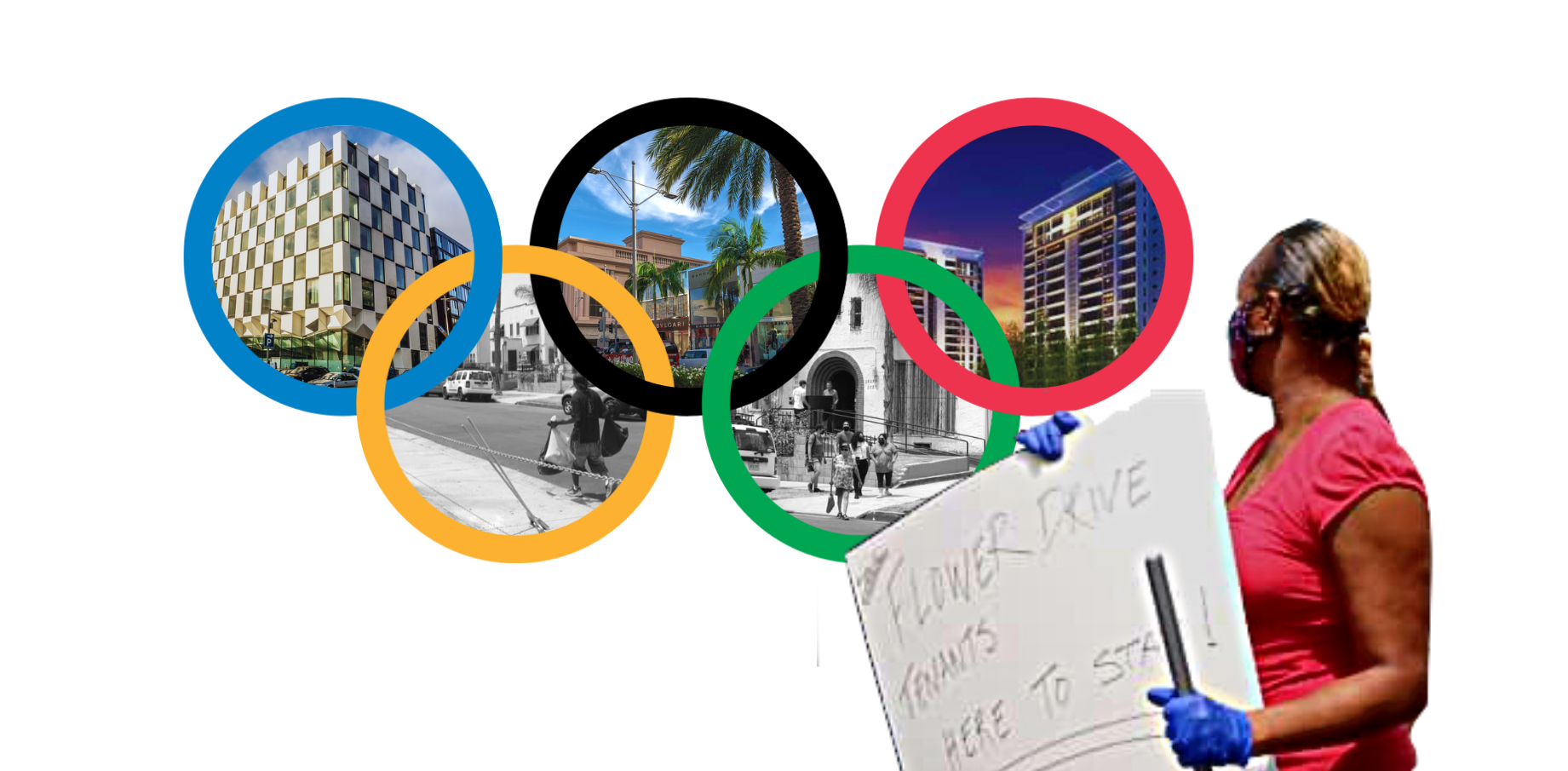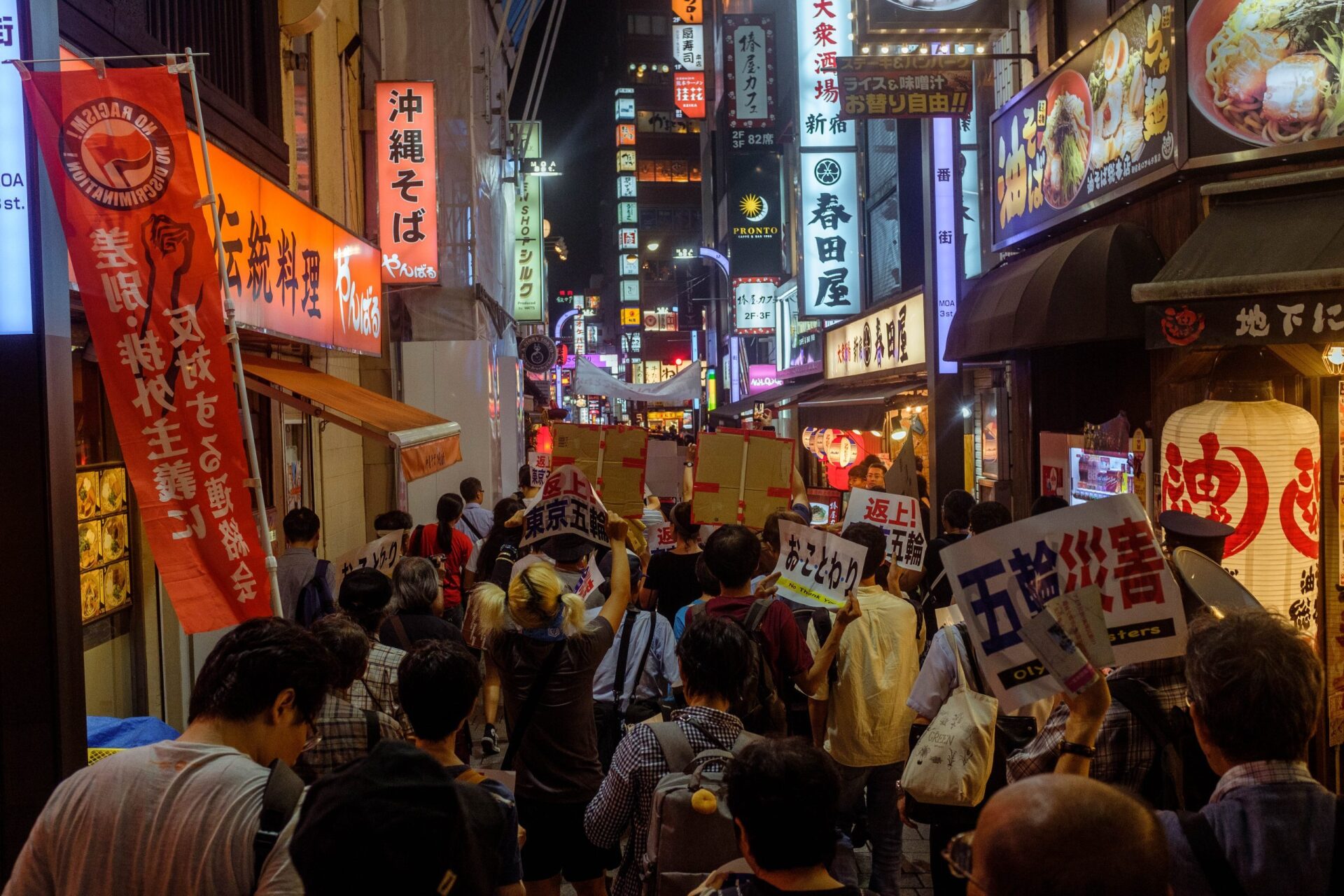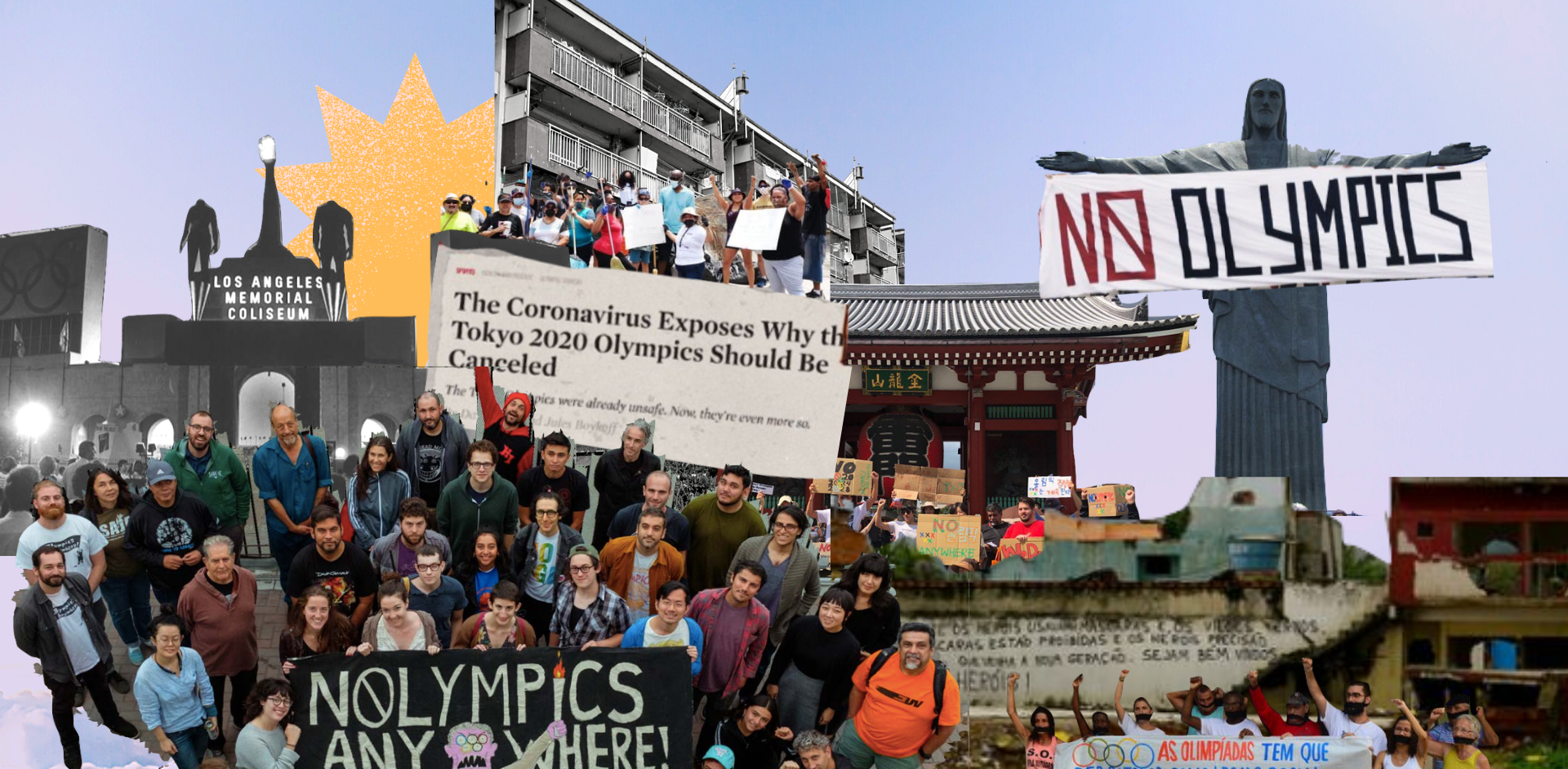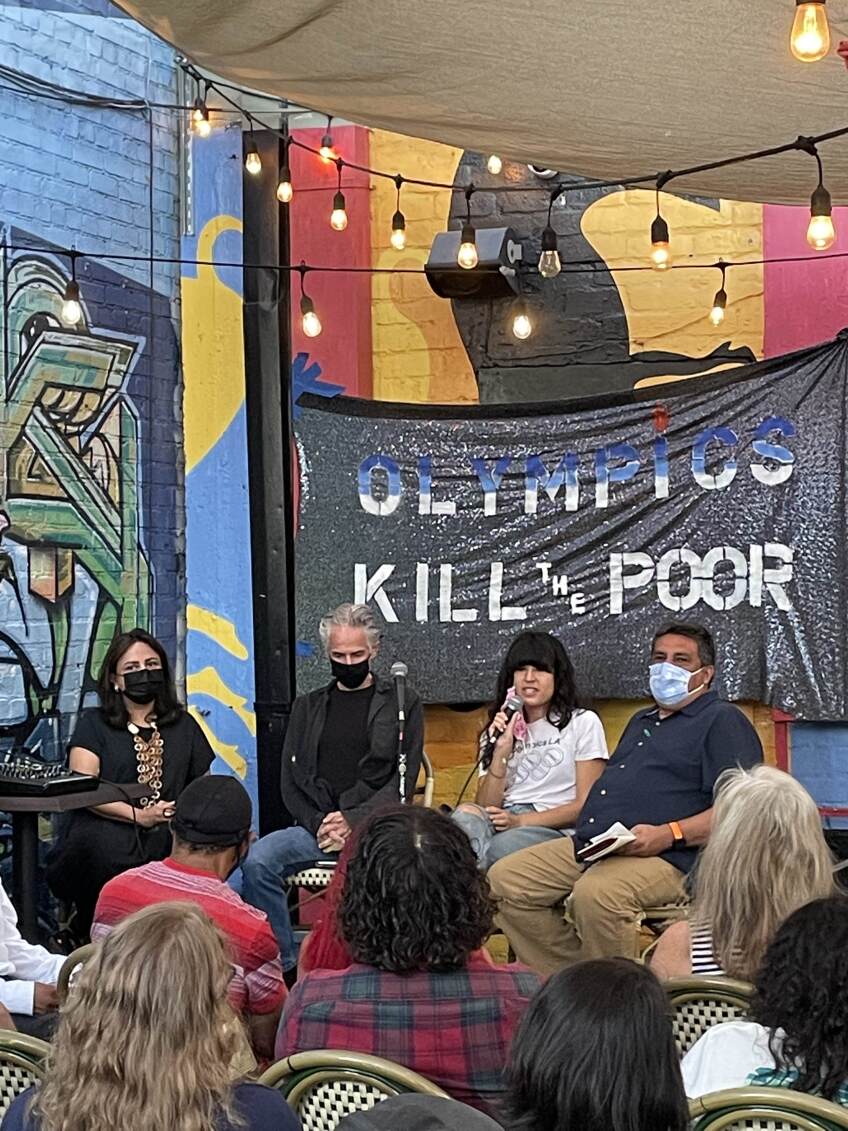
The Tokyo Olympics May Be Over, But for NOlympics LA the Fight has Just Begun
On July 23rd, 2021, the Olympics kicked off with the Opening Ceremony in Tokyo. Millions around the world tuned in to watch athletes marching and carrying flags in front of thousands of empty seats in a city under a state of emergency due to the pandemic.
Meanwhile, at Stories Books and Cafe in Echo Park, a masked crowd packed into a small back patio for another kickoff event, the "NOpening Ceremony," organized by local grassroots activists to rally support for the movement to stop the 2028 Olympics from coming to L.A.
On a low stage, under a glittering handmade banner that read "Olympics Kill the Poor," moderator Dr. Ananya Roy welcomed the crowd. "We are gathered here as a counterpoint to the Opening Ceremony of the Tokyo Games," said Roy, professor at the University of California, Los Angeles (UCLA), and founding director of the UCLA Luskin Institute on Inequality and Democracy, which co-sponsored the event with NOlympics LA. "That Olympic spectacle, that seeming dream image is, in fact, a nightmare… [it] has always been a land profiteering scheme with the excuse of world harmony."
Dr. Jules Boykoff, professor of Politics and Government at Pacific University and author of five books on the Olympics, showed off the "Denver 1976 Olympics" memorabilia pin on his jacket.
"Now you might be thinking — I don't remember that one,'" Boykoff said, to cheers from the crowd. "That's because it never happened, folks."
The canceled Denver Olympics, the result ofsuccessful environmentalist and activist pushback, is a model of what could happen in L.A. But NOlympics LA's aspirations are bolder than that — the organizers are invested in building transnational resistance to the Olympics, to reject Olympics anywhere in the world, rather than pushing it into someone else's backyard.
Born out of the Democratic Socialists of America Los Angeles' Housing and Homelessness Committee in 2017, the all-volunteer core group of NOlympics LA has grown into a large coalition of community-based organizations, both local to Los Angeles and in cities all over the world. Theiranalysis of the Olympics places organizing against the Games at the intersection of housing justice, racial justice, class oppression, policing and democracy.

The ‘84 Olympic Legacy of Police Violence that Haunts L.A.
Lisa Kwon, organizer with NOlympics LA, said learning about the connection between the 1984 L.A. Olympic Games and the 1992 Los Angeles uprising inspired her involvement in the fight against the 2028 Games.
Kwon, L.A. Koreatown born-and-bred, grew up in the shadow of the '92 riots media coverage that sensationalized racial tensions, rather than critically examining the structures and power players driving unrest — developers, lawmakers, and racist policing. Connecting the militarized policing introduced by the '84 Olympic Games to the violence incited against her communities over the following eight years — culminating in the '92 riots — illuminated the larger forces pitting marginalized folks against each other.
The 1984 Olympics ushered in the Los Angeles Police Department's (LAPD) "Olympic mode." As Boykoff explained, when the Olympics come to town, "the host governments basically have carte blanche to get all sorts of weapons, special laws and funding that would be difficult to get during normal times."
In L.A., the threat of "global terrorism" was used to justify increased policing. "[LAPD Police Chief] Daryl Gates got all these special weapons," said Boykoff. It exacerbatedconditions of military occupation for Black and brown residents of South L.A. and East L.A. These communities remember the 1984 Olympics very differently than do affluent, suburban white residents, who touted the 84 Games as an economic triumph. A Los Angeles Times investigative report detailed how, in the five years following the Olympics, reports of police brutality went up 33%. The post-Olympic years ushered in crackdowns on poor neighborhoods through gang sweeps, the racialized War on Drugs, and the astronomical rise inpolice violence leading up to Operation Hammer, in which 24,684 Black youths were targeted for gang violence and arrested. The terror of the raids was so extreme thatthe Red Cross intervened to offer shelter to families and youth left homeless.
In one case described by historian Max Felker-Kantor, an LAPD SWAT team employed a military-grade V-100 tank-like vehicle secured from the Olympics to demolish an alleged "rock house," only to find two women and three children inside eating ice cream — no weapons or cocaine.
Once you beef up LAPD personnel or come up with new practices on how to ‘crack down’ on crime during the Games, it doesn't all just go away after the Olympics happens.Lisa Kwon, NOlympics organizer
The '92 riots were an eruption against the injustices communities of color had experienced for far too long, with many parallels to the national uprisings that occurred last summer. Last summer's Black Lives Matter calls to defund the police led to an LAPD budget reduction of $150 million, but the victory was short-lived. More recently, Mayor Garcetti has increased LAPD's 2021-22 budget by 3% from last year, to a total annual budget of $1.76 billion.
With the legacies of hyper-policing and hyper-surveillance living on in Los Angeles, NOlympics LA organizers believe the '28 Olympics are positioned to unlock and hasten a new frontier of all-too-familiar patterns of police violence against people of color.
Several speakers at the NOpening Ceremony brought up the events at Echo Park Lake on March 24th, where the LAPD carried out the first night of a militarized police sweep of the hundreds of unhoused people and protesters residing at the park. Activists and unhoused residents in the NOlympics coalition, many of whom are also involved in Street Watch L.A. and Stop LAPD Spying, viewed the sweep as part of the city's efforts to prepare for the Games.
Kwon also pointed out the newly signed-into-law ordinance, 41.18, which criminalizes unhoused people for sitting or lying on a sidewalk, designated in most public spaces. She fears that the criminalization of homelessness will only get worse, and clearing the streets will not just be isolated to the Olympic timeframe.
"Once you beef up LAPD personnel or come up with new practices on how to 'crack down' on crime during the Games, it doesn't all just go away after the Olympics happens," Kwon said. "The [additional] police are here to stay, and so are the methods and techniques that brutalize Black and brown neighborhoods, that keep the poor, poor, and keep people living on the streets."

The Housing Crisis, Swept Under the Rug
"[The developers] don't want to witness what they are doing to us, they don't want to acknowledge that we are people... that we are going to go through extreme struggles," said Abdul Hood, describing the real estate speculation in his community.
Hood, a resident of the Flower Drive Historic District near the L.A. Coliseum, sees pictures of his family home in marketing materials for Exposition Point, a 450 million dollar, mixed-use mega-development being created in his neighborhood. He says neither he nor his neighbors have been offered a seat at the table in negotiations.
Hood, a tenant leader at the Flower Drive Tenants Association, shared his story at NOpening Ceremony to illustrate his fight against displacement, which organizers believe will become increasingly common as the Games approach. Despite developers' attempts to speculate on their rent-controlled neighborhood for years, Hood's family has managed to stay in their home since 1978. When Hood's mother passed away, his landlord, an investment group called Ventus Group, tried to deny the family members' rights to stay as tenants. With support from the Los Angeles Tenant Union, Hood started organizing with his neighbors and formed a tenant association. According to the Ventus website, his block will be razed for Expo 38, a 65-unit student housing project developed in conjunction with Exposition Point "to create an unparalleled off-campus living experience for USC students," projected to be completed by 2023.

Representatives of Expo 38 have publicly denoted the connection between the slated housing and commercial projects and the upcoming Games. According to the Los Angeles Business Journal, Ventus representative John David Booty said the Exposition Point development will "help support the city's tourism industry and meet demand for the 2028 Olympic and Paralympic Games."
In the "teaser video"above, Ventus Group's John David Booty pitches the Expo 38 development to investors.
According to NOlympics organizer Anne Orchier, the Olympics create a pretext to speed up this sort of development and propose new luxury buildings that gentrify low-income neighborhoods.
"It doesn't matter [whether or not] L.A. needs more venues," Orchier said. "The people who are trying to advance an agenda of social cleansing in our city are going to find ways to exchange the land value and the demographics of an area. The Olympics are a great excuse to do that."
We've been here since before some of these [developers] were even born.Abdul Hood, Flower Drive Tenants Association organizer
Past games have been criticized for displacing low-income communities to build big new stadiums, Olympic villages, and tourist housing. For the 1996 Games, Atlanta demolished the Techwood Homes, the first public housing complex in the U.S., to build a 20-acre urban green space, Centennial Olympic Park. Blocks away, the historically redlined, predominantly-Black neighborhood of Summerhill was targeted for demolition to build the Centennial Olympic Stadium.
LA28, the Organizing Committee for the 2028 Olympic & Paralympic Games, seeks to acknowledge these histories of displacement with their "no-build" agenda, a plan to utilize "one hundred percent existing and temporary venues" to host the Olympics. In a fact sheet forwarded to KCET by LA28, the organization describes the most sustainable venue as "the one you don't have to build" and spotlights their commitment to green initiatives.
According to NOlympics LA, the "no-build" narrative disguises the imminent displacement and gentrification that still occur, even without the creation of new stadiums and hotels.
"Sometimes [the loss of housing] isn't as black and white as a developer coming in and razing the land to build a new development," Kwon said.
For example, the 2028 Olympics will likely reduce the housing stock for longtime residents through a rise in rentals through Airbnb, which has struck up anine-year deal with the IOC. Airbnbs are notorious for driving up the cost of rent in low-income neighborhoods, leading to displacement. Organizers also question the ethics of allowing tens of thousands of rentals to sit vacant for most of the year when, as of a June 2020 report, 66,436 L.A. residents are unhoused and the city is in the midst of a severe housing shortage.
While a 2018 ordinance made it illegal to rent out short-term (30-day or less) spaces that are not a lessor's primary residence or rent-stabilized, thousands of illegal listings skirt this law. NOlympics LA hosts a map named"Locks on my Block," allowing renters to report the presence of unlawful Airbnb rentals that quietly crop up throughout the city.

Cynthia Strathmann, Executive Director at Strategic Actions for a Just Economy (SAJE), responded to the concept of a "no-build" Olympics with skepticism, pointing to all the development still going on, and noting that the rhetoric doesn't match the reality. Privately-funded, 70,000-seat SoFi stadium, which has garnered headlines for accelerating through development in Inglewood despite worker deaths and COVID-19 scares, has been heralded as the venue for Los Angeles' "decade of opportunity," with the Olympics and the Super Bowl on the roster of planned events.
The rapid gentrification of Inglewood, one of California's last African-American enclaves, has residents asking why the city is prioritizing the sale of public land for sports venues rather than for affordable housing.
Tenants like Hood are asking for basic respect, to be spoken to and recognized as stakeholders in the community they built. Instead, Hood feels that developers' pursuit of profits has rendered his history and community disposable.
"[Ventus] puts up a lot of resources to push us out, to attack us, to offer us cash for keys, but if you're going to talk to us, talk to us like we have some power," said Hood. "We've been here since before some of these [developers] were even born."

Building Unprecedented Transnational Solidarity
A group of El Sereno-based unhoused and housing-insecure families called Reclaiming Our Homes, or the "Reclaimers", supports the work of NOlympics. In March 2020, the families occupied vacant homes in El Sereno owned by the state transportation agency Caltrans. After months of negotiations, Reclaiming Our Homes members, city and state officials, and the Housing Authority of the City of Los Angeles (HACLA) successfully implemented a transitional housing agreement with Caltrans to move into the homes legally for two years.
Reclaimer Martha Escudero said they learned strategies from Brazil-based groupMuseu Das Remoçôes (Museum of Evictions), based in the favela Vila Autódromo, that fought against displacement from the Rio Olympics. "Museu Das Remoçôes is a movement led by mothers and women of color," Escudero said, some of the most vulnerable to the Olympic's impacts.
The Brazil-based group has also sent words of support to the U.S.-based Olympics opposition movement.
Members of Vila Autódromo recently sent us a message about how they've fought for the right of 20 families stay in their community through tenant-led struggle. #NOlympicsAnywhere pic.twitter.com/pqoccFxkjU
— NOlympics LA #NOlympicsAnywhere (@NOlympicsLA) August 6, 2019
What makes NOlympics unique in the history of anti-Olympics organizing, according to Boykoff, is its emphasis on transnational solidarity-building, where groups support each other in the recognition that global struggles for liberation and justice are interconnected.
In July 2019, NOlympics LA held the first-everinternational anti-Olympic summit in Tokyo, gathering activists from South Korea, London, Brazil, France and several other cities. Over the course of a week, organizers attended workshops on housing rights, swapped tactics for obstructing the Olympic bid process, and connected issues of policing and gentrification transnationally. They visited Fukushima's nuclear disaster zone and witnessed firsthand the ongoing neglect of families seeking medical and government support, despite the Tokyo 2021 Olympics' branding as the "recovery games." Midway through the summit, the organizers marched through the streets of Shinjuku for a global day of action with allies around the world.
Learning from anti-Olympics activists in other countries illuminates the shared struggles and commonalities between working-class people and communities of color globally. One finds that histories of displacement run deep in every place the Olympics has touched. For example, roughly 200 families, mostly elderly, were evicted from theKasumigaoka public housing community to make way for a Tokyo Olympics stadium. In Rio de Janeiro 2016, it was 77,000 people displaced; in Beijing 2008, 1.5 million people;in Seoul 1988, 700,000.
"The general rule is that in the Global North, it's more gentrification. In the Global South, it's more forced displacement," said Boykoff, who lived in Rio de Janeiro during the 2016 Rio Olympics and conducted research on political economics, activism and the Olympics as a Fulbright scholar.
According to Orchier, the myth of American exceptionalism drives the narrative that L.A. isn't capable of perpetuating such an extreme scale of poverty or deprivation of its residents. She believes the global throughlines of displacement and police militarization that target the poorest, most vulnerable people illuminate the urgency of the global fight against the Olympics.
Uniting activists worldwide against the International Olympics Committee (IOC), which Boykoff described as "a multibillion-dollar behemoth," is a huge undertaking. The labor of transnational organizing — meeting across various time zones and language barriers — is difficult and slow. Still, to make sure NOlympics LA doesn't just push the problem somewhere else, Boycott believes it's crucial that the struggle be global.
"Because the Olympics are this sort of peripatetic behemoth that moves around the world, I think organizers are smart to start moving around the world with it," he said.

The Abolitionist Stance Against the Olympics
At the NOpening Ceremony, Anne Orchier shared about her organizing roots in Union de Vecinos, a community-based, anti-gentrification group that successfully forced up-market art galleries out of its neighborhood of Boyle Heights.
At the time, the power dynamic between the well-resourced galleries versus the working-class, immigrant community made the effort feel insurmountable to Orchier. But her neighbors and fellow organizers stood firm in their demand that the galleries leave, and their victory was a watershed moment for her understanding that gentrification could be flat-out refused.

In 2018, the galleries were offering what Orchier called "aesthetic, superficial" concessions, like free children's art workshops or one-off donations to local charities. The organizers felt they should instead be acknowledging their role in contributing to skyrocketing rents, loss of longtime businesses, displacement of working-class tenants and increased LAPD presence in the neighborhood. Similarly, Orchier believes that a major selling point from the LA28 proposal — the IOC's plan to invest $160 million in children's sports programs across Los Angeles — does not address the salient concerns about gentrification and police militarization.
"In theory, if the IOC sat down and said 'we're willing to consider some of these things' and had demonstrated a capacity to [reform], we might be having a different conversation," Orchier said. "By the time you're saying abolish the Olympics, there has been a long period — not just from us but from people from other cities — of trying to reform them. So now we're saying 'abolish.'"
Boykoff traces the problem of the Olympics back to the IOC itself, which he described as having "an incredibly high royalty quotient." He has publicly suggested reform to the IOC to no avail and believes that as long as the IOC is in control of the Olympic Games, transformation is impossible due to its lasting allegiances to corporate and elite interests.
NOlympics organizers also caution against developers' seeming "win-win" negotiations that cover up harm or deprive communities of agency in the long term. They point to research showing how Community Benefits Agreements, framed as tools for communities to mitigate development impacts through provisions from the developer, have often failed to slow rent rises and demographic changes in neighborhoods, and frequently lack transparency in development and implementation.
Tenant organizers in the coalition want to have a real role in the decision-making about their neighborhoods, which includes the community's right to self-determination, as well as benefits for long-term residents.
By the time you're saying abolish the Olympics, there has been a long period — not just from us but from people from other cities — of trying to reform them.Anne Orchier, NOlympics organizer
An far-off event like the Olympics may not be on most people's minds day-to-day, so Strathmann at SAJE sees her organization's role as keeping people aware of the Games and their impacts. That helps residents to notice changes in their neighborhoods and step up in their communities to advocate for themselves.
Kwon also views community awareness-raising as key to successful organizing. "The challenge is changing the reformists to abolitionists," she said.
Meanwhile, the group's efforts are helping to shift the narrative around the Games. At a city council meeting earlier this year, councilmembers Mike Bonin and Nithya Raman opposed the proposal to create a special Olympic security unit for the 2028 games.
Everyone agrees that the work has to be done in coalition, building on past and ongoing movements, and prioritizing community care and compassion. Denouncing the IOC, combating Airbnb, advocating for affordable housing and organizing against police militarization can only happen in solidarity and through connecting the struggles of marginalized people all over the world.
"It's as if the Olympics come in and help create these bonds between activists that might not have worked together otherwise," Boykoff said.
Correction: An earlier version of the article stated that Reclaiming Our Homes was a part of a standoff between the California Highway Patrol and home reclaimers in November 2020. Reclaiming Our Homes is separate from the November 2020 group of reclaimers and had no role in the standoff. Reclaiming Our Homes is not officially part of the NOlympics coalition, but it is in solidarity with NOlympics' work and several members of Reclaiming Our Homes are involved in NOlympics organizing.



